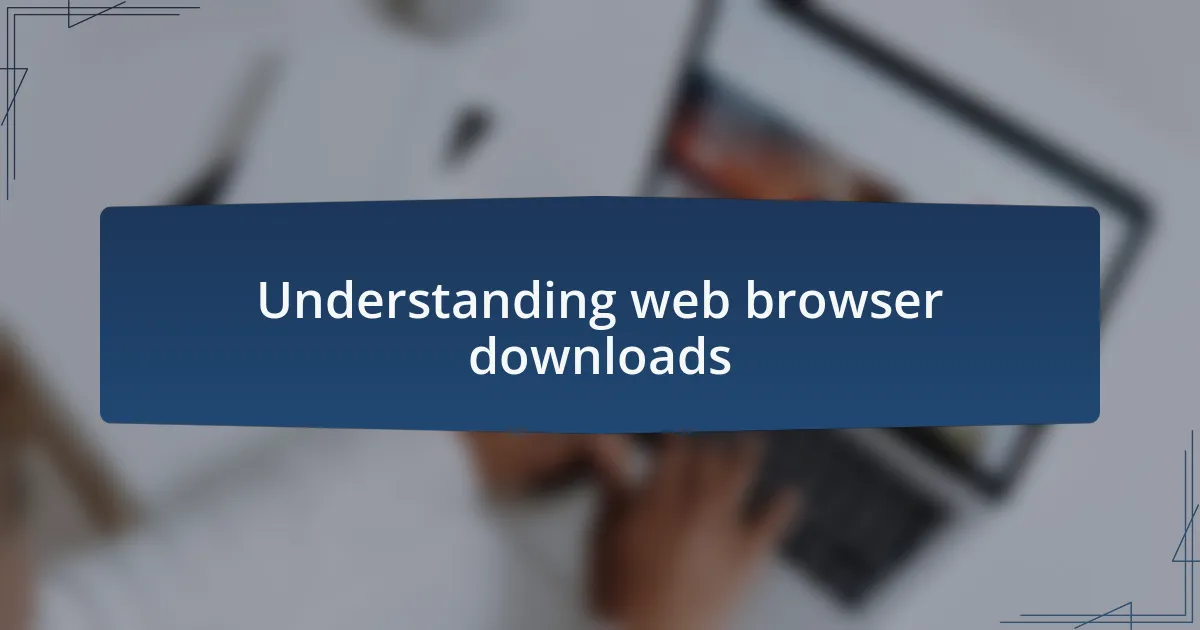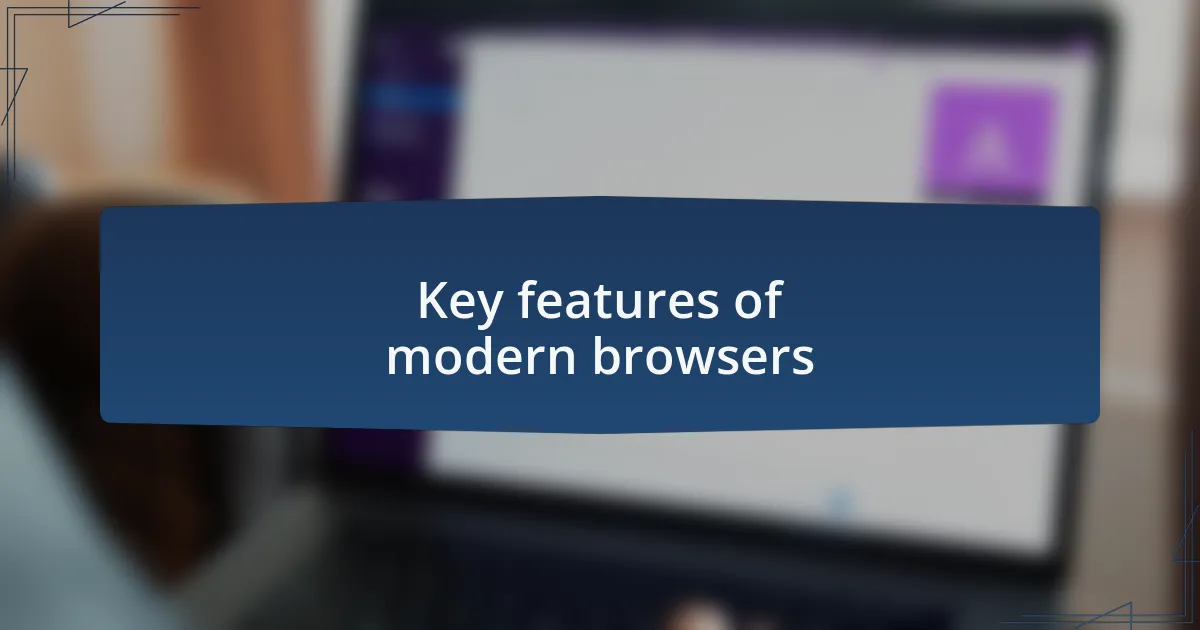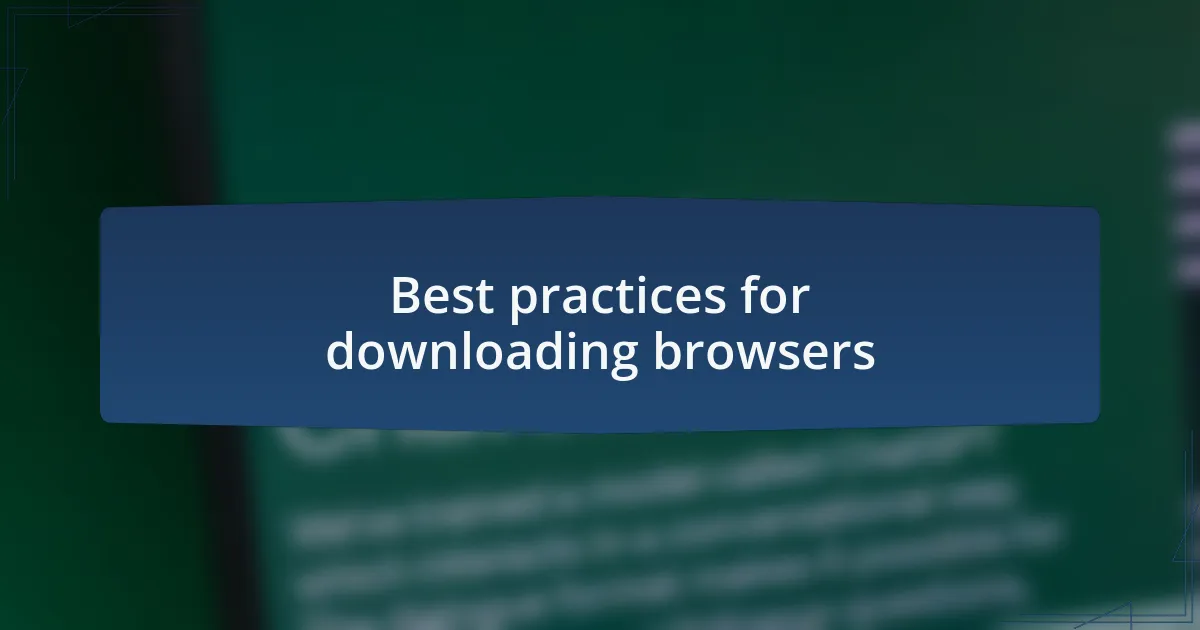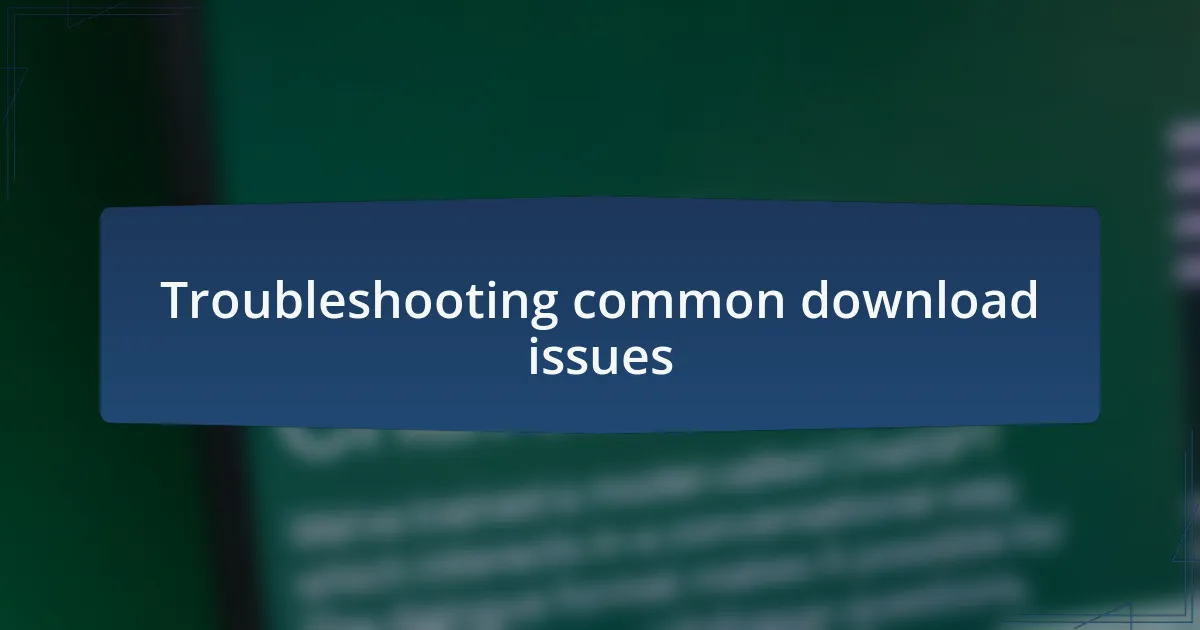Key takeaways:
- Understanding browser download management is crucial for efficiency and productivity, emphasizing the need to familiarize oneself with browser settings.
- Regular system and browser upgrades enhance performance, security, and compatibility with new applications, opening opportunities for growth.
- Best practices for downloading browsers include using official sources, reading user reviews, and following installation instructions for optimal experience.
- Organizing downloads and maintaining a clean file management system are essential strategies for reducing frustration and improving workflow.

Understanding web browser downloads
Understanding web browser downloads is more than just clicking a button; it’s about knowing what files you’re bringing into your digital space. I remember my first experience when I downloaded a file, and my screen lit up with warnings about security risks. It was a nerve-wracking moment! The immediate thought was, “Is this safe?” This led me to explore browser safety features that help assess downloads before they are fully initiated.
As I’ve navigated various browsers over the years, I’ve learned that each has unique download management systems. Some browsers consolidate downloads into a single list, while others categorize them by type, which can be quite handy. Have you ever lost track of a file and spent ages searching for it? I certainly have! It’s moments like these that showcase the importance of familiarizing yourself with how your browser handles downloads for a smoother experience.
Moreover, understanding the download settings is crucial for optimizing your workflow. I tweak these settings according to my needs, especially when I’m working on multiple projects. For instance, setting my preferred download location saves me so much time! How do you manage your downloads? I always find that having a personalized approach to managing downloads can significantly influence productivity and reduce frustration.

Importance of system upgrades
Upgrades play an essential role in system performance and security. When I updated my operating system recently, I was amazed at how much faster everything ran. This experience reminded me that staying current helps avoid software glitches that could hinder productivity. Have you ever faced a frustrating delay while browsing? It’s moments like that which highlight how important system upgrades are.
Additionally, system upgrades often include valuable security patches. I recall a time when I neglected to update my antivirus software, and I ended up facing a malware scare. That experience was eye-opening; regular updates can provide a strong defense against potential threats. It’s startling how easily a minor lapse in maintenance can lead to significant risks.
Moreover, keeping systems upgraded ensures compatibility with new applications and features. I remember attempting to run a newly-released design tool only to find out my operating system was too outdated. It was disappointing to miss out on something that could have enhanced my creativity. Upgrading is more than just a technical necessity; it’s about opening up opportunities for growth and innovation in our daily digital lives.

Key features of modern browsers
Modern web browsers come packed with features that significantly enhance user experience. For example, I love how many browsers now support tab management tools. Just the other day, while juggling multiple projects, I found myself overwhelmed with open tabs. The ability to group and organize them made it feel like I had my own digital workspace, boosting my productivity remarkably.
Security has also taken center stage in recent browser updates. I vividly remember an instance when a pop-up warning saved me from clicking a potentially harmful link. These built-in security features, like built-in phishing protection and regular security updates, are vital in today’s online landscape. They create a safer browsing environment, giving me peace of mind as I explore the web.
Furthermore, modern browsers emphasize speed and efficiency. I recently switched to a browser that uses a streamlined engine, and the difference was noticeable right away. Pages loaded instantly, eliminating the annoying lags I’d grown accustomed to. It made me appreciate how a faster browser can transform the browsing experience into something not just effective but also enjoyable. What features have you found essential in your browsing?

Best practices for downloading browsers
When it comes to downloading browsers, one of the best practices I follow is ensuring that I get the software directly from the official website. I once made the mistake of downloading a browser from a third-party site, and it ended up installing unwanted software on my device. I learned my lesson the hard way, so I now always double-check the website’s URL to confirm authenticity. Have you ever had a similar experience?
After verifying the download source, I make it a point to read through user reviews and feedback before committing to a new browser. This approach has saved me from switching to programs that look great on paper but might lack the features I really need. Just a few days ago, I was considering a new browser touted for its privacy features, but the reviews highlighted numerous bugs. I appreciate knowing upfront what I might encounter.
Lastly, I never skip the installation instructions. Even though they seem basic, I’ve found that some browsers have specific settings that can enhance performance right from the start. During my last installation, I took a moment to customize privacy settings and add useful extensions, which significantly improved my browsing experience. Have you taken the time to explore those features when choosing a browser?

Troubleshooting common download issues
Occasionally, I encounter issues where downloads simply won’t start. I remember a time when I was eager to get the latest browser update, but the download kept stalling. After some frustration, I realized that a simple check of my internet connection revealed some temporary disruptions. This taught me the importance of ensuring a stable connection before diving into downloads. Have you found yourself in a similar situation?
Sometimes, I find that downloaded files don’t appear where I expect them to. There was an instance where I thought a browser was installed, only to spend an hour searching through folders and files. Checking my browser’s settings and download location ultimately helped me locate the missing download. I often wonder how many others face this common oversight – have you ever lost a crucial file?
Finally, encountering error messages during downloads is another hurdle I’ve faced. I recall a frustrating moment when an installation failed with a “file corrupt” warning. It turned out that my antivirus software was blocking the download, mistaking it for a threat. Understanding how my security settings interact with downloads has been a game-changer for smooth installations. Have you ever had to tweak your security settings to get that important download?

My personal download strategy
When it comes to my personal download strategy, I prioritize organization from the start. I always create a dedicated folder for downloads on my computer. This simple step has saved me countless hours searching for files in the chaos of my desktop. Have you ever felt overwhelmed by an unorganized downloads folder?
Another trick I’ve adopted is to read reviews before downloading new software. I remember the first time I downloaded a popular extension without checking its ratings. It turned out to be riddled with bugs, slowing my browser to a crawl. Now, I spend a few minutes researching to ensure I’m getting something that truly enhances my browsing experience. Isn’t it worthwhile to invest a little time upfront to save headaches later?
Finally, I make it a habit to delete files I no longer need right after I finish using them. I once had hundreds of outdated installers cluttering my drive, which made it hard to find what I actually wanted. It’s liberating to clear out the old and make room for the new. How do you manage your downloads to keep your system running smoothly?

Lessons learned from browser upgrades
Upgrading my browser has taught me invaluable lessons about both functionality and user experience. I once approached an upgrade with skepticism, fearing it might disrupt my daily workflow. However, I learned that many enhancements streamline tasks and introduce features I never knew I needed, like built-in ad blockers that reduce distractions. Have you ever hesitated to upgrade out of fear of change?
One memorable upgrade brought significant performance improvements, which I didn’t expect. After the update, pages loaded faster, and resource consumption was noticeably lower, allowing me to multitask more efficiently. It was eye-opening to realize how much a well-timed upgrade could breathe new life into my browser. Isn’t it fascinating how technology evolves and can directly enhance our productivity?
There was a time when I overlooked the importance of reading the release notes during an upgrade. Ignoring them led to confusion as I navigated the new interface, missing out on some features that could have significantly improved my experience. Now, I make it a point to review these notes, embracing the learning curve that comes with change instead of shying away from it. How do you approach new features in your upgrades?